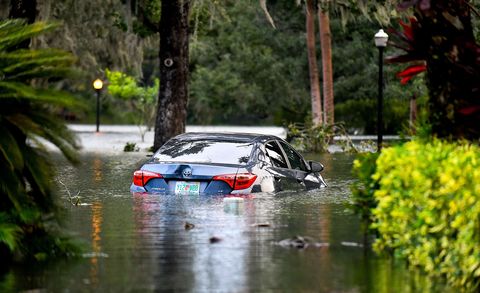- The primary damage from Hurricane Ian was to the people of Florida and the Carolinas, but an unknown number of cars were also flooded in the massive storm last weekend.
- If you’re shopping for a used car in the coming months, you do not want to get a flooded vehicle, especially without knowing that the car once went swimming.
- Below, we list four steps to take if you suspect the car you’re shopping for might have been involved in a flood.
Hurricane Ian tore through Florida this past weekend, leaving behind at least 100 dead and millions in property damage. Before fading away, Ian dropped more water on North and South Carolina. We don’t yet know how many vehicles were ruined in the storm, but at least one
McLaren P1 was carried away by the rising waters. For comparison, when Hurricane Ida rained down on multiple states, from Louisiana to New York, it damaged an estimated 212,000 cars, according to Carfax.
Once the car has had a chance to dry out and go through a cleaning, the fact that it was submerged might be challenging to notice. Teresa Murray, consumer watchdog at the U.S. Public Interest Research Group, told Car and Driver there are many ways a smart shopper can spot a previously flooded car. There are many more reasons why you don’t want to end up with a flooded vehicle, she said.
“You don’t want any part of a flooded vehicle, no matter whether the damage is disclosed and no matter what assurances you get from a seller,” Murray said. “If you suspect a vehicle may have sustained flood damage, move on. Don’t be tempted to roll the dice. You’ll almost surely be buying a headache and just wasting your money.”
What If It’s Your Car That’s Flooded?
Murray said there are a few ways owners deal with flooded cars. If they have insurance and the vehicle is more than 75 percent ruined, the insurance company will take possession and reimburse the owner. These cars might end up in the used-car marketplace, but they’ll come with a salvage title red flag. Owners without insurance may try to sell their waterlogged rides if the water didn’t make the vehicle undrivable, and it’s up to these owners to disclose what happened to the car. Some will and some won’t. Even if sellers tell prospective buyers that the vehicle briefly served as a boat, the full extent of the damage might not be evident, which brings us to the caveat emptor part of the story.
Steps to Spotting a Water-Damaged Car
Courtesy of the Federal Trade Commission and the PIRG, here are some things to look for if you suspect you’re looking at a previously flooded vehicle:
- Check for visual clues. These might not be obvious at first glance, so check under the seats and dashboard for mud or sand. The carpet might be loose, stained or mismatched. Is there any moisture in the headlights? Are many components just too new for the car? Rust around the doors, especially near any fasteners like screws, could signal that the car spent time underwater.
- Use your nose. Any hint of mold or decay in the cabin or trunk area is a warning sign, and a strong smell of cleaning products might just be trying to cover something up.
- Do some research. The National Insurance Crime Bureau (NICB) offers a free, searchable database of vehicle identification numbers (VIN) that might turn up a salvage title even if the seller isn’t forthright about the car’s past, as long as the car was insured when the damage occurred. Check whether the vehicle was registered in Florida or the Carolinas until recently. The federal government also operates the National Motor Vehicle Title Information System (NMVTIS), which provides free historical information about a vehicle. The NMVTIS offers more detailed information, including accident and repair history, for a fee.
- Ask for help. If you’re unsure but really want the car, have an independent mechanic look it over. A mechanic might be able to find signs of water damage in the powertrain or electrical systems that you don’t see yourself.
Finally, be a good citizen and report fraud. The NICB, the FTC, and state attorneys general accept tips about shady characters selling flood-damaged vehicles without revealing what happened.
This content is imported from poll. You may be able to find the same content in another format, or you may be able to find more information, at their web site.
This content is imported from OpenWeb. You may be able to find the same content in another format, or you may be able to find more information, at their web site.

